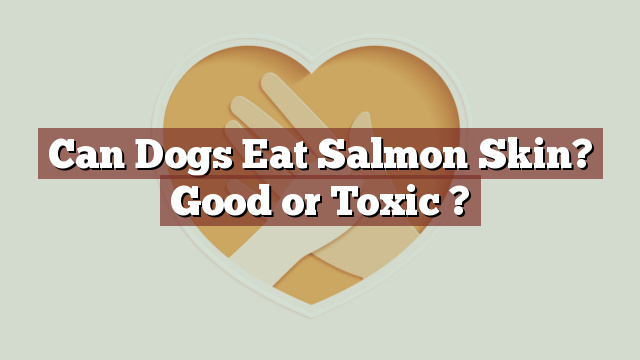Can Dogs Eat Salmon Skin? Good or Toxic?
Knowing what foods are safe for our furry friends is essential to ensuring their overall health and well-being. Among the many questions that pet owners may have, one that often comes up is whether dogs can eat salmon skin. In this article, we will explore the nutritional value of salmon skin, examine the safety of feeding it to dogs, discuss potential risks or benefits, and provide tips and recommendations if your dog consumes salmon skin.
Nutritional Value of Salmon Skin: What Does it Offer?
Salmon skin is known to be a good source of omega-3 fatty acids, which are crucial for maintaining a healthy coat and skin condition in dogs. It also contains protein, vitamin D, and B vitamins such as niacin and vitamin B12. These nutrients contribute to the overall health and vitality of our canine companions.
Can Dogs Eat Salmon Skin? Exploring Safety for Furry Friends
Yes, dogs can eat salmon skin in moderation. However, it is important to note that not all dogs will tolerate it well. Some dogs may have sensitivities or allergies to fish or certain components of the skin, leading to digestive issues or skin irritations. It is advisable to introduce salmon skin gradually into your dog’s diet and closely monitor their reaction.
Potential Risks or Benefits of Feeding Salmon Skin to Dogs
Feeding salmon skin to dogs can have both potential risks and benefits. On the positive side, the omega-3 fatty acids found in salmon skin can improve the condition of your dog’s skin and coat, reducing dryness and itchiness. These fatty acids also support joint health and may reduce inflammation. Additionally, the protein content in salmon skin can contribute to muscle development and maintenance.
However, it is crucial to be aware of the potential risks associated with salmon skin. Firstly, some salmon may contain parasites or bacteria that could pose a health threat to dogs. Therefore, it is vital to ensure that the salmon skin is properly cooked or prepared to eliminate any potential pathogens. Secondly, the high fat content in salmon skin could lead to gastrointestinal upset or pancreatitis in dogs, especially if consumed in excessive amounts.
If Your Dog Eats Salmon Skin: Tips and Recommendations
If your dog accidentally consumes salmon skin or you decide to include it in their diet, here are some tips and recommendations to keep in mind:
- Moderation is key: Limit the amount of salmon skin your dog consumes, especially if they have never had it before. Start with small portions and observe their response.
- Proper preparation: Ensure that the salmon skin is thoroughly cooked or prepared to eliminate any potential pathogens.
- Monitor your dog’s reaction: Watch for any signs of digestive upset or allergic reactions, such as vomiting, diarrhea, or itchiness. If any adverse symptoms occur, discontinue feeding salmon skin and consult your veterinarian.
Conclusion: Considering the Safety and Benefits of Salmon Skin for Dogs
In conclusion, dogs can eat salmon skin as part of a balanced diet, taking into account individual sensitivities and moderation. The omega-3 fatty acids and other nutrients found in salmon skin can be beneficial for your dog’s skin, coat, and overall health. However, it is important to be mindful of potential risks, including the presence of parasites or bacteria in raw or undercooked salmon, as well as the high fat content. Always consult your veterinarian before making any significant changes to your dog’s diet and monitor their response to new foods. By being informed and cautious, you can ensure the safety and well-being of your furry companion.
Thank you for investing your time in exploring [page_title] on Can-Eat.org. Our goal is to provide readers like you with thorough and reliable information about various dietary topics. Each article, including [page_title], stems from diligent research and a passion for understanding the nuances of our food choices. We believe that knowledge is a vital step towards making informed and healthy decisions. However, while "[page_title]" sheds light on its specific topic, it's crucial to remember that everyone's body reacts differently to foods and dietary changes. What might be beneficial for one person could have different effects on another. Before you consider integrating suggestions or insights from "[page_title]" into your diet, it's always wise to consult with a nutritionist or healthcare professional. Their specialized knowledge ensures that you're making choices best suited to your individual health needs. As you navigate [page_title], be mindful of potential allergies, intolerances, or unique dietary requirements you may have. No singular article can capture the vast diversity of human health, and individualized guidance is invaluable. The content provided in [page_title] serves as a general guide. It is not, by any means, a substitute for personalized medical or nutritional advice. Your health should always be the top priority, and professional guidance is the best path forward. In your journey towards a balanced and nutritious lifestyle, we hope that [page_title] serves as a helpful stepping stone. Remember, informed decisions lead to healthier outcomes. Thank you for trusting Can-Eat.org. Continue exploring, learning, and prioritizing your health. Cheers to a well-informed and healthier future!

